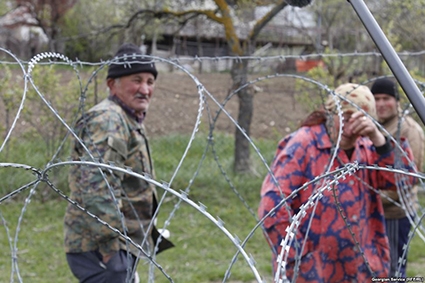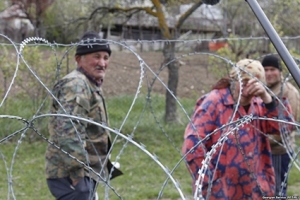MFA Releases Report on Human Rights Violations in Occupied Territories
The Ministry of Foreign Affairs of Georgia (MFA), in the third quarterly report on the human rights in Georgia’s occupied regions, has found that the installation of barbed wire fences across the occupation line had added gravity to an already tense situation.
The Report published in early December covers the period from July to September 2015, exposing human rights violations in the occupied territories of Georgia.
“Gross violations of human rights, including torture and inhuman treatment, illegal detention, restriction of free movement and mass infringement of property rights and the right to receive education in the native language, continue to be reported from the occupied territories,” the report reads.
The document is based on open and public information sources and is prepared in coordination with various Georgian government agencies.
The aim of the report is to update the international community on the human rights situation in Georgia’s occupied territories.
Meanwhile, the 34th round of the Geneva International Discussions was held on December 9th, co-chaired by the EU, UN and OSCE and attended by participants from Georgia, the Russian Federation and the United States, alongside de-facto Abkhazian and Ossetian leaders and representatives of Abkhazia’s legitimate government.
According to the MFA, after the 6-hour-long session, while reviewing the return of internally displaced persons and refugees, representatives of Sokhumi and Tskhinvali occupation regions, and later the participants from the Russian Federation, walked out of the talks. “As a result, according to the established practice, the co-chairs had to stop the discussions.”
The participants from Georgia reviewed the security situation in the occupied regions. In particular, emphasis was placed on the results of implementation of the so-called “treaties” signed by Russia with Sokhumi and Tskhinvali, as well as concerns over the militarization of Abkhazia and Tskhinvali regions, with an increase seen in the number of illegal military drills and violations by the Russian Federations of the airspace controlled by the central Government of Georgia.”
The Georgian delegation focused on the statement by the so-called “Abkhazian Defense Minister”, that the united group of military forces may be involved in military operations outside Abkhazia region, which once again illustrates the necessity to ensure the non-use of force and the international security arrangements in the occupied territories.
The MFA stated that the Georgian participants thoroughly discussed restrictions on education in native language in the occupied territories, in particular in the Gali district, and demanded they ensure the possibility to receive education in the Georgian language.
“During the discussion of the issue, Georgian participants and representatives of international organizations underscored the need for international monitoring on the ground, in order to properly assess how the right to receive education in their mother tongue is protected,” the MFA announced.
“Discussion was also held on the restrictions on the free movement for the local population and property rights violations, and in this context it was noted that discrimination on ethnic grounds is totally unacceptable.”
Several civic organizations working for IDP issues, led by the Center for Reforms and Monitoring, assembled in front of the EU office of Tbilisi on December 3rd.
The peaceful demonstrators were protesting against the current situation in Gali region, calling it “an exact form of racism against Georgians on the ground.”
How should rights of Georgians on the occupied regions be protected? What actual mechanisms can the Georgian government employ in the process?
Zviad Adzinbaia












